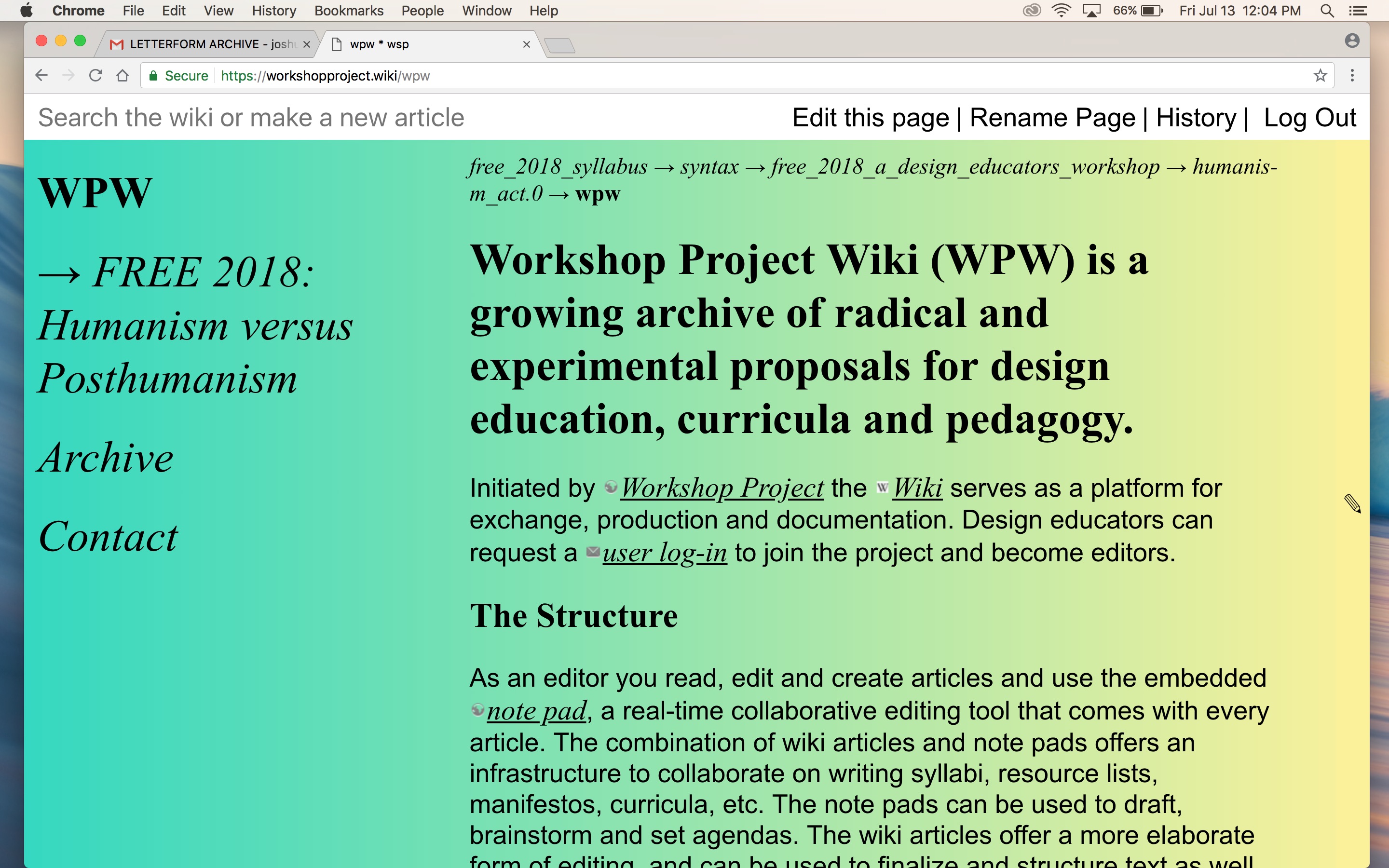This is an old revision of the document!
HUMANISM 2.0
As a subgroup, identify ONE thing that is critical for students in your HUMANISM 2.0, HYPERHUMANIST, PALEOHUMANIST, PSEUDOPOSTHUMANIST, ULTRAPOSTHUMANIST, or RETROPOSTHUMANIST graphic design program to learn, do or experience.
Is it a skill, a body of content, an experience, a language, a process or method?
Is it from within graphic design or from outside?
Propose a tool, a platform and an activity for teaching your one thing.
ACTIVITY
- Learn then misuse technology to address a pressing contemporary issue.
- The technology can be software and/or hardware.
- The issue can be personal, social, and/or political.
- Work as a group – or – pass the project among individuals.
- Venezky Rule: Go slowly, make this one project over a semester.
LINKS
Flavorwire: Is Ai Weiwei's Twitter Bigger Than His Art?
Industrial Era Ended and so will the Digital
Cedric Price on The Potteries Thinkbelt
1957 PREFACE TO MYTHOLOGIES, ROLAND BARTHES
The following essays were written one each month for about two years, from 1954 to 1956, on topics suggested by current events. I was at the time trying to reflect regularly on some myths of French daily life. The media which prompted these reflections may well appear heterogeneous (a newspaper article, a photograph in a weekly, a film, a show, an exhibition), and their subject-matter very arbitrary: I was of course guided by my own current interests. The starting point of these reflections was usually a feeling of impatience at the sight of the 'naturalness' with which newspapers, art and common sense constantly dress up a reality which, even though it is the one we live in, is undoubtedly determined by history. In short, in the account given of our contemporary circumstances, I resented seeing Nature and History confused at every turn, and I wanted to track down, in the decorative display of what-goes-without-saying, the ideological abuse which, in my view, is hidden there.
Right from the start, the notion of myth seemed to me to explain these examples of the falsely obvious. At that time, I still used the word 'myth' in its traditional sense. But I was already certain of a fact from which I later tried to draw all the consequences: myth is a language. So that while concerning myself with phenomena apparently most unlike literature (a wrestling-match, an elaborate dish, a plastics exhibition), I did not feel I was leaving the field of this general semiology of our bourgeois world, the literary aspect of which I had begun to study in earlier essays. It was only, however, after having explored a number of current social phenomena that I attempted to define contemporary myth in methodical fashion; I have naturally placed this particular essay at the end of the book, since all it does is systematize topics discussed previously.
Having been written month by month, these essays do not pretend to show any organic development: the link between them is rather one of insistence and repetition. For while I don't know whether, as the saying goes, 'things which are repeated are pleasing', * my belief is that they are significant. And what I sought throughout this book were significant features. Is this a significance which I read into them? In other words, is there a mythology of the mythologist? No doubt, and the reader will easily see where I stand. But to tell the truth, I don't think that this is quite the right way of stating the problem. 'Demystification' - to use a word which is beginning to show signs of wear - is not an Olympian operation. What I mean is that I cannot countenance the traditional belief which postulates a natural dichotomy between the objectivity of the scientist and the subjectivity of the writer, as if the former were endowed with a 'freedom' and the latter with a 'vocation' equally suitable for spiriting away or sublimating the actual limitations of their situation. What I claim is to live to the full the contradiction of my time, which may well make sarcasm the condition of truth. 1957 - R. B.
* 'Bis repetita placent': a paraphrase, used in French, of Horace's saying 'Haec decies repetita placebit' (Ars Poetica).



